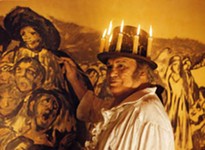Behind the Screens
Hidden Hollywood and other secret histories
By Will Robinson Sheff, Fri., Dec. 28, 2001

Maya Deren and the American Avant-Garde
edited by Bill NicholsUniversity of California Press, 333 pp., $19.95 (paper)
With her striking beauty, fierce-willed self-promotion, and outspoken pronouncements on the liberation of cinema, Maya Deren is ingrained in the mythology of American experimental film as much for her outsized persona as for her oeuvre of revolutionary films. Maya Deren and the American Avant-Garde, a new collection of essays on the connection between that persona and those films, finds theorists -- feminist, postmodernist, psychoanalytical, and bisexual alike -- making heroic bids to claim Deren as their field's very own foremother before grudgingly admitting the rigid, anachronistic singularity of her vision. Deren decried surrealism, yet her films, especially her famous Meshes of the Afternoon, were most often labeled surreal. She worked to "depersonalize" film, but cannily used her own persona to market her films, which often starred herself. She celebrated modern technology while centralizing the role of "primitive" ritual. Her observations could be hackneyed or remarkably prescient. Riddled with delicate contradictions, the legacy of Deren stubbornly refuses to be integrated into any system except her own, which she outlined and revised in forcefully argued texts and college lectures. Consequently, the intermittently fascinating and frustrating volume that sets out to contextualize her is at its best during those moments when its chorus of modern critical voices becomes overwhelmed by the small, strong voice of Deren herself.








